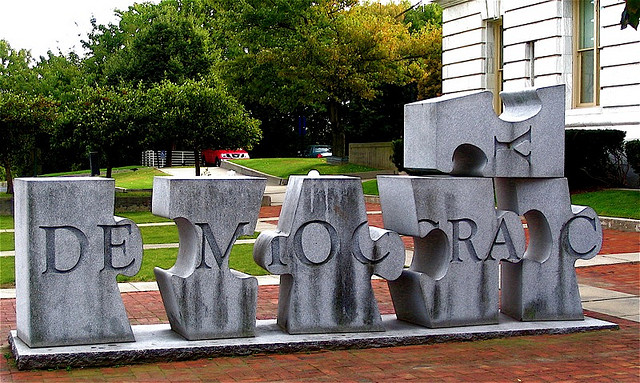Like this article? Chip in to keep stories likes these coming.
The weakening of fundamental human rights such as the rights of association and of expression, the State-sponsored intrusion in the private realm via secret electronic surveillance, the creation of powerful media conglomerates, the reduction of citizenship to voting rights, etc.: in the wake of such events, even the most charitable observer of liberal democracy could ask if this regime is not experiencing an authoritarian turn.
Worse still, is it not in the very spirit of representative government to concentrate power in the hand of the few? Indeed, at its origins, the representative regime was devised to allow for a small number of powerful men to make, between equals, the “best” decisions for the community.
Yet, various social struggles nevertheless allowed for the conquest of participatory spaces within representative government. It is precisely these gains that are under attack today.
The oligarchic logic of liberal democracy
Modern democracy rests upon three central institutions: representative government, the political party system, and the bureaucracies of the welfare state. To understand the current evolution of democracy, we must appreciate the type of government and of “governmentality” that it enacts.
The task of the founders of representative government was to create a system other than democratic, that bestowed power to a few virtuous gentlemen “whose wisdom may best discern the true interest of their country” and who could “guard against the confusion of a multitude” (Madison).
In order for this configuration of power to be democratically sanctioned, the founders combined representation with election. This apparent concession to democracy did not, in fact, modify the oligarchic or aristocratic spirit of the regime since only the few (oligos) can represent the many. The vote does not and cannot designate “anybody and everybody,” elections are designed to designates notables. The oligarchic figure of reference of such a regime is the honourable patrician whose political capacity rests upon a positioning at the very top of the socio-economic pyramid.
The political party system was created in response to the extension of voting rights in the 19th century in order to channel the newly unleashed democratic energies through parties organized on a hierarchical basis. Instead of deepening democracy, political parties became vehicles for leaders to mobilize activists and win elections.
As such, they stifle political spontaneity and creativity as well as allow for the few to govern the many. Hence, the political party system fosters the emergence of a specific type of oligarch: the exemplary activist able to organize and convince in order to ensure the victory of the party. The work of such an activist does not signify, though, the participation of the demos in the exercise of power.
The great bureaucracies, born in the wake of the extension of the powers of the State, are founded upon, and legitimized by, a form of practical knowledge, namely the law, economics and administrative science. Bureaucracies constitute a self-justifying realm that seeks to reproduce itself. The logic of bureaucracy, guided by the ideal of efficient administration (Weber), commands an ever-greater extension of its operations.
In this context, the oligarchic figure par excellence is the technocrat who dominates by virtue of a specific knowledge and of an exclusive access to an expertise that is rendered inaccessible to the many.
Although power elites take advantage of this oligarchic configuration to consolidate their privileges, this configuration is not the result of a “conspiracy.” It is rather the consequence of a mixture of contingent events, demographic imperatives, logics of efficiency, of organization and of rationality, of intentions and of the process of complexification of society.
“Savage” democracy
If representative government slowly incorporated participatory elements, it was not because it suddenly discovered the virtues of democratic rule. It is because of social struggles that forced it to temper its oligarchic nature through the “savage” participation (Lefort) of social forces, despite their repression and criminalization by the State.
From worker’s fighting for the control of the means of production to women’s struggles for the extension of the right to vote and for the control of their bodies, as well as the African-American civil rights movement and the struggles for social, economic, and civic rights around the globe: all of these struggles, and many more, created democratic spaces within “liberal oligarchies” (Castoriadis).
These democratic spaces are today threatened by the repression and the criminalization of collective action, and by the State’s ability to intrude in the private sphere. Such steps backwards have at least the merit of reminding us that elections do not ensure the democratic quality of representative government and that democracy remains the ability for all to equally participate in the articulation of common norms.
To preserve democracy, we must exercise it through a “savage” participation, in the streets and in our daily lives; a democratic participation that does not ask permission to those whom, on the pretext of having been elected, seek to restrain it.
Martin Breaugh, Associate Professor, Department of Political Science, York University
Ricardo Peñafiel, Adjunct Professor, Department of Political Science, Université du Québec à Montréal
This piece was published originally in French at Le Devoir.
Like this article? Chip in to keep stories likes these coming.



